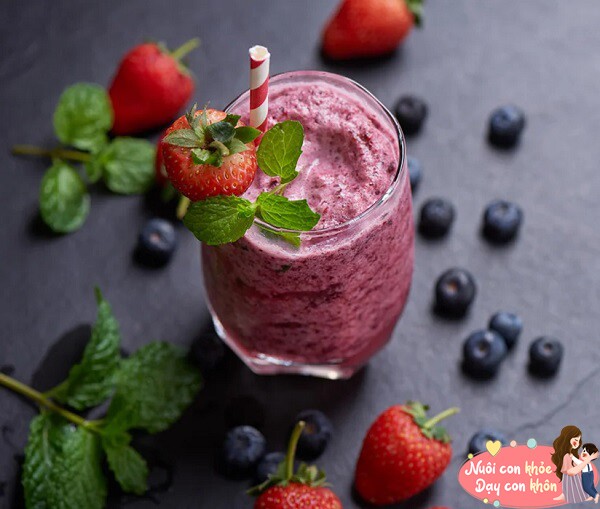Nutrition experts have shared dietary suggestions for students taking exams, offering easily digestible meals that provide brainpower and support memory and performance.


Six brain-boosting and digestion-friendly meal suggestions for students
Steamed Grouper – A “brain food” that nourishes without causing drowsiness
Grouper is rich in DHA and protein, which can help maintain brain health and alertness. DHA, an omega-3 fatty acid, is crucial for brain development and function.
Research indicates that DHA plays a pivotal role in enhancing memory and focus. Particularly during stressful exam preparation, DHA supplementation from grouper can aid in maintaining mental clarity and efficient information processing.
Steaming tip: Cut the fish into pieces and add a few slices of ginger.
– Steam for 10-15 minutes after the water boils.
– Drizzle with sauce.
– Garnish with chopped scallions.

Steamed grouper nourishes the brain without causing drowsiness.
Walnut-Shrimp Stir-Fry – A “golden memory booster” combination
Walnuts nurture the brain, while shrimp provides nutrients for a refreshed mind.
Cooking tip: Rinsing shrimp with tapioca starch will make them chewier and cleaner.
– Toast the walnuts beforehand for enhanced aroma.
– Stir-fry to retain the freshness and tenderness of the ingredients.
– Season to taste.

Walnut-shrimp stir-fry is a tasty and nutritious dish.
Beef Soup – An energy-packed, tasty, and filling soup
This soup, featuring beef, beans, and tomatoes, effectively boosts energy levels. Beef is an excellent source of protein, providing essential amino acids for muscle development and overall health.
Additionally, beef contains iron, a vital mineral that improves oxygen transport in the blood, thereby enhancing energy and endurance, especially during intense study periods.
Cooking tip: Pre-seasoned ground beef ensures tenderness.
– Fry the tomatoes until the oil turns reddish.
– Add a little starch to the soup to make it lighter and easier to digest.
– Garnish with coriander for extra flavor.

Beef soup with beans, potatoes, and carrots.
Stir-fried Beef with Celery and Onions – A “natural sedative” that alleviates stress and soothes the nerves
Dishes incorporating celery and onions offer health benefits, particularly in reducing anxiety. Celery is rich in vitamins K, C, and potassium.
The antioxidants in celery help calm the nervous system, alleviating stress and anxiety. Its high water content also aids hydration, maintaining a positive mood, and reducing fatigue.
Onions contain quercetin, a flavonoid with anti-inflammatory and antioxidant properties. Quercetin is known for its stress-reducing and immune-boosting abilities.
Cooking tip: Slice the beef thinly.
– Soak the onions beforehand to remove their pungency.
– Cut the celery into easy-to-stir-fry pieces.
– Stir-fry over high heat to retain crispness.
– Season to taste.

Stir-fried beef with celery.
Red Date, Longan, and Millet Porridge – The ideal “sleep-inducing porridge” for the night before the exam
Red dates enrich the blood, longans soothe the nerves, and millet eases the stomach. This porridge is a perfect choice for the night before the exam.
Porridge-making tip: Soak the millet for about 30 minutes before cooking.
– After the water boils, add the rice and a small amount of millet to prevent sticking.
– Subsequently, add the red dates and longans, cooking until soft.

Red date, longan, and millet porridge.
Blueberry Smoothie – A “brain-fueling” breakfast option
The anthocyanins in blueberries can enhance memory, and when combined with the probiotics in yogurt, it becomes a perfect breakfast choice.
Preparation tip: Opt for unsweetened yogurt for better health.
– Rinse fresh blueberries thoroughly.
– Consider adding some oatmeal for a more filling smoothie.
– Best served chilled.

Anthocyanins in blueberries boost memory.

Tips for healthy and nutritious meals during exams

Maintain a relaxed mindset
Exams are a crucial period, and it’s essential to stay calm and relaxed during this time. A positive mindset boosts confidence and enhances academic performance. To achieve this, parents should create a supportive and positive environment for their children.
Firstly, encourage your child to engage in physical activities like sports, which reduce stress, stimulate creativity, and foster positive energy for learning.
Additionally, ensure your child gets sufficient and quality sleep to recharge their energy and improve focus. Establish a reasonable sleep schedule, allowing ample rest before the exams.

Maintain a relaxed mindset.
Avoid sudden changes in eating habits
Sudden dietary changes can cause discomfort and affect concentration and academic performance. Instead, maintain a healthy and balanced diet. Ensure your child receives sufficient nutritious foods like fruits, vegetables, grains, and protein.
Opt for warm foods
It’s advisable to prioritize warm meals. Warm foods are easier to digest and help keep the body warm.
They stimulate efficient digestion, reducing the risk of bloating and indigestion. Soups, porridge, and stews are comforting and gentle on the stomach.
Raw foods like sushi, raw seafood, or raw vegetables may harbor harmful bacteria, while cold drinks and desserts can also disrupt digestion.
Frequent small meals
Instead of three large meals, consider providing smaller, frequent meals to maintain stable energy levels and prevent hunger.
Offer nuts and fruits as snacks. Nuts like almonds, walnuts, and cashews are not only nutritious but also provide sustained energy. Fresh fruits like bananas, apples, and strawberries are excellent choices.

Avoid sudden changes in eating habits.
Encourage adequate hydration
During exam preparation, ensure your child stays well-hydrated to maintain health, alertness, and mental clarity.
Offer warm water, which is easier to digest and soothes the stomach, especially if your child exhibits signs of stress or anxiety. Warm water can also stimulate digestion and induce a sense of calm.
Alternatively, prepare a mild honey drink by mixing a small amount of honey into warm water. Honey contains natural sugars and beneficial nutrients, boosting immunity and providing quick energy.
Meals prepared with care and attention to nutrition ensure your child approaches this pivotal moment in their life with optimal health and a positive mindset.
The Ultimate Fish: The Japanese Secret to a Healthy Diet
The Japanese have a well-deserved reputation for longevity, glowing skin, and sharp minds, and the secret to their success lies in their dietary habits. They hold a special affinity for a particular fish, the Japanese mackerel, or as it is fondly known, “saba.” This humble fish is revered in Japan for its delicious taste and exceptional health benefits.
How Many Minutes of Napping is Enough to Recharge and Boost Your Health?
“Taking a nap is a great way to recharge during the day, but how long should you sleep for optimal health? This is a question on many people’s minds, as they strive to balance their busy schedules with their health and well-being. A quick power nap or a longer slumber – what’s the ideal duration for a midday siesta?”






































